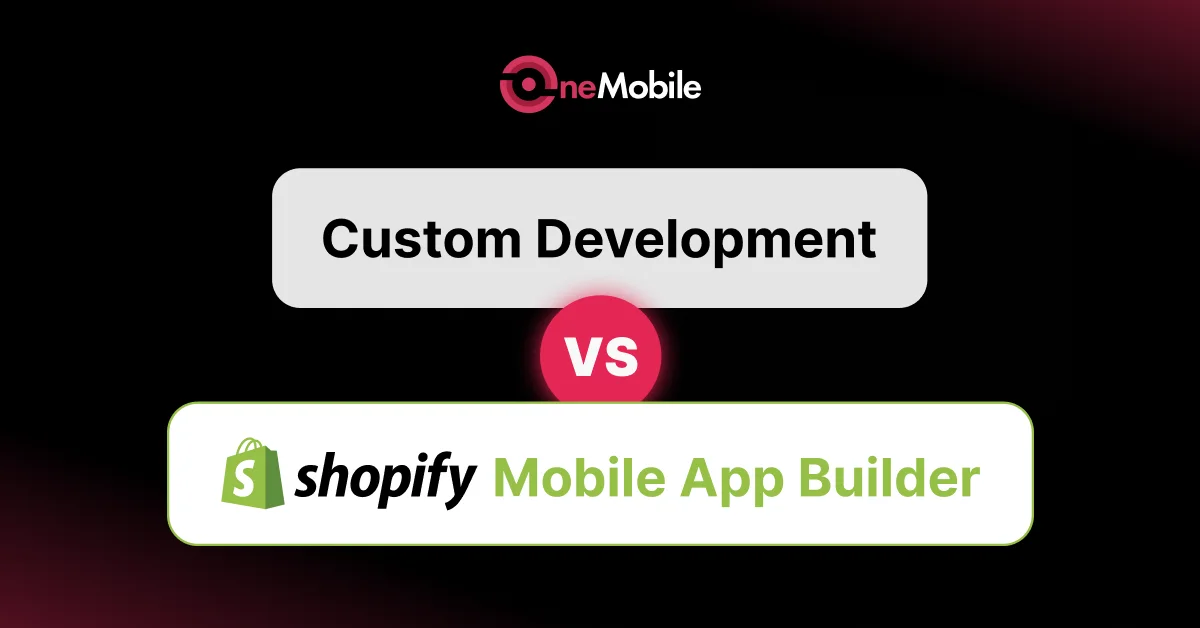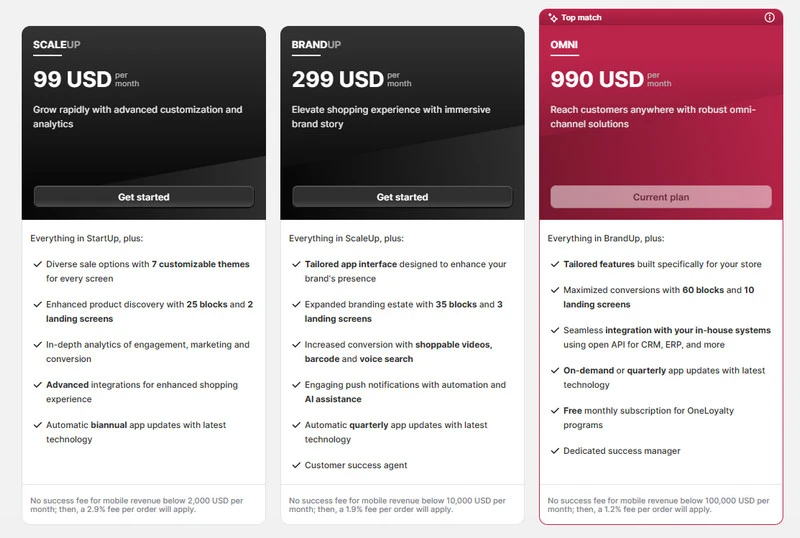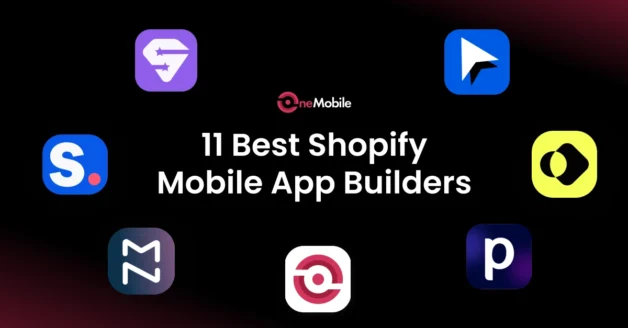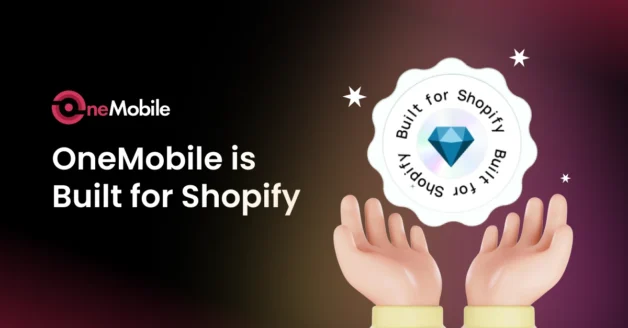January 26, 2026
Shopify Mobile App Builder vs Custom Development: Which Better Suits You?

Offering a dedicated shopping app is quickly becoming a must-have for Shopify stores – not just a nice-to-have. From improving conversion rates to boosting customer loyalty, mobile apps can play a powerful role in driving ecommerce growth. But when it comes to building one, store owners are faced with a key decision: Shopify mobile app builder vs custom development, which route makes more sense for your business?
This choice has long-term implications for your budget, timeline, user experience, and scalability. In this guide, our mobile commerce experts will compare the two mobile app-building approaches under 10 crucial aspects:
- Time to market
- Cost
- App submission
- Customization capabilities
- Push notifications
- Integration
- Built-in sales and marketing tools
- App’s performance and analytics
- App updates and maintenance
- Loyalty program
Let’s dive in!
What is a Shopify mobile app builder?
Shopify mobile app builders are platforms that enable merchants to turn their Shopify stores into native iOS & Android mobile shopping apps without code or low code needed. These platforms are designed for simplicity, with features like drag-and-drop editing, ready-to-use templates, and seamless integration with your Shopify backend.
Leading Shopify mobile app builders like OneMobile offer Shopify merchants several benefits, such as:
- Cost-efficiency: Unlike custom services that can cost a fortune, Shopify mobile app builders charge much lower fees, allowing businesses to build a functional app without much cost upfront.
- Instant sync with Shopify: Product listings, collections, orders, and customer details stay up-to-date automatically; no manual syncing is required.
- Push notifications: Reach your users instantly with promotions, updates, and reminders to keep them engaged and boost conversions.
- No code & drag-and-drop editing: Adjust layouts, colors, and fonts to reflect your brand identity; no need for design or coding expertise.
- Smooth in-app checkout: Give customers a seamless purchasing experience with Shopify’s secure and familiar checkout system.
- Loyalty and rewards built in: Encourage repeat business with loyalty points, discount tiers, and other in-app perks designed to keep users coming back.
What is Shopify mobile app custom development?
With custom development, your mobile app is built entirely from the ground up to match your specific business needs. Instead of starting with templates, developers create each feature from scratch, giving you complete control over how the app looks, works, and grows over time. Additionally, Shopify API integration syncs products, orders, and customer data in real time while enabling advanced features like AI recommendations and AR shopping.
The choice of technology depends on your target platforms:
- Native development uses Swift for iOS or Kotlin for Android to deliver the best performance.
- Cross-platform frameworks like React Native or Flutter allow you to build apps for both iOS and Android more efficiently.
Here’s how the development process usually unfolds:
- Planning & wireframing: Include features, structure, and user journey.
- Design & development: Create the UI and backend, integrate with Shopify API for real-time sync and custom features like AI, loyalty rewards, or AR shopping.
Testing & optimization Identify bugs and fine-tune performance for a smooth user experience. - Deployment & maintenance: Publish the app to the App Store and Google Play, then manage updates and support.
App builder vs app custom development comparison
Let’s take a closer look at how the two options compare:
| Factor | Shopify mobile app builder | Custom development |
| Time to market | From 1 to 4 weeks | From 8 to 24+ weeks |
| Cost | Cost-effective, starting from $99; No upfront development cost | High initial investment ($10,000-$100,000+) |
| App submission | App builders’ support teams usually handle for you | Developer must prepare and submit manually to App Store and Google Play |
| Customization capabilities | Flexible design with drag-and-drop editing, customizable layout, branding, and components | Unlimited customization tailors every feature and design from scratch |
| Push notifications | Often built in with no third-party push notification platform integration | Requires custom setup and third-party service integration |
| Integration | Seamless Shopify integration — real-time sync with products, orders, and customer data out of the box | Uses Shopify API — more flexible but requires manual setup and ongoing management |
| Built-in sales and marketing tools | Includes banners, promo blocks, countdowns, campaigns, upsells, and more | Only available if specifically developed — takes extra time and budget |
| App’s performance and analytics | Optimized for Shopify stores; basic analytics and performance tools included | Can be highly optimized and customized for specific performance and tracking requirements |
| App updates and maintenance | Platform updates and bug fixes are usually handled for you | Requires in-house or external dev team — all updates, fixes, and compliance handled manually |
| Loyalty program | Integrated or plugin-ready — easily enable loyalty features via loyalty apps | Fully customizable — create advanced loyalty features tailored to your business goals, but at a higher cost and dev effort |
1. Time to market
Speed is often the first and most pressing concern for merchants eager to tap into mobile commerce.
Shopify app builders significantly shorten the launch timeline. With pre-built templates, real-time Shopify syncing, and drag-and-drop editors, most brands can go live in as little as 1 to 4 weeks. Builders like OneMobile, Shopney and Tapcart often offer app themes, a drag-and-drop editor and dedicated launch support.
On the other hand, custom development follows a longer, more intricate path. From initial requirement gathering and UI/UX design to backend coding, QA testing, and store submission, a custom-built app often takes 8 to 24 weeks—or more, depending on complexity.
2. Cost
One of the biggest perks of app builders is that they have much more affordable pricing and a predictable subscription model.
For instance, with OneMobile, you can build a basic app for just $99/month. As you scale up and need more advanced features like voice commerce, image search, etc., you can move to more premium tiers that still cost a fraction of the custom services’ expenses.

Meanwhile, custom-built apps come with a significant upfront investment. A basic app may cost between $5,000 and $15,000, while a feature-rich product—especially one that includes AR, advanced loyalty logic, or omnichannel syncing—can exceed $100,000. And the spending doesn’t stop post-launch; ongoing costs for maintenance, updates, and compliance are part of the long-term equation.
For startups or growing businesses, this can be a significant barrier to entry and often comes with financial risk if the app doesn’t perform as expected.
3. App submission
App builders make publishing to the App Store and Google Play relatively stress-free. Most builders like OneMobile offer end-to-end submission support, including app icon creation, listing optimization, and compliance reviews. Hence, if you are unfamiliar with developer accounts or Apple’s submission process, you will benefit immensely from this hands-on support.
With custom-built apps, your developer (or internal team) must prepare and submit the app to both app stores. This involves configuring certificates, provisioning profiles, creating listing assets, testing for compliance, and resolving any rejections or guideline issues. If revisions or rejections occur, the submission process can take several days or weeks.
4. Customization capabilities
Most Shopify mobile app builders allow users to easily customize their app’s look and layout using a drag-and-drop editor—no coding needed. You can personalize colors, fonts, and key components like banners and loyalty blocks to fit your brand, making it a practical choice for most Shopify stores.
However, app builders still operate within certain platform constraints. So, for merchants who need fully tailored shopping flows, deeply integrated search filters, or niche UX requirements, custom development is often the better way to go, with more flexibility and control.
That said, some app builders are bridging this gap by offering more advanced, flexible features within a no-code environment. OneMobile, for example, goes beyond the basics by including professional-grade capabilities such as shoppertainment modules, voice and image search, and a built-in wishlist system.
5. Push notifications
Push notifications are key to driving engagement and sales through your mobile app. With custom development, the push notification function isn’t usually included, so you may need to pay extra to integrate with third-party services and cover ongoing platform fees.
Meanwhile, app builders often include push notifications and scheduling tools out of the box with no third-party service needed.
6. Integration
Custom development often comes with high additional fees if you want to add integrations. Additionally, the integration process can be complex and challenging for your customer service team to manage or update.
In contrast, most builders offer ready-made connectors that require just a few clicks to enable, such as:
- Transcy: Localize your mobile app into 148 languages and 169 currencies to expand globally
- OneLoyalty: Build loyalty programs with rewards, referrals, and VIP tiers to increase repeat purchases
- Klaviyo: Automate email and SMS marketing campaigns to boost sales and retention
- Judge.me: Display verified reviews and ratings in your app to improve trust and conversions
7. Built-in sales and marketing tools
Most Shopify mobile app builders offer various built-in sale and marketing tools like promo banners, flash sale countdowns, upsell sections, and seasonal campaign templates that can be managed without code. These tools help merchants run fast, effective promotions—especially useful for flash sales, product drops, or holiday campaigns.
Meanwhile, in a custom-built app, sales and marketing tools aren’t included—you have to request each feature during the planning phase, which takes more time, testing, and money to implement. Features like promo banners or in-app upsells may require backend logic, design input, and integration with external marketing tools.
8. App’s performance and analytics
Shopify app builders are performance-optimized out of the box. They’re built specifically for Shopify merchants, with mobile speed, caching, and syncing already handled. Basic analytics (user activity, conversion rates, installs) are usually included, and some builders allow third-party tracking integration.
However, custom development can offer greater flexibility if your business has more complex data needs. With a custom app, you can decide exactly what data to collect and how to display it. For example, you might want to track specific user journeys, tie app behavior to your internal CRM or reporting tools, or create role-specific dashboards for different teams.
9. App updates and maintenance
With app builders, platform updates are handled for you. Whether it’s a change in Shopify APIs, Apple SDKs, or Android store policy, the builder takes care of compatibility fixes, bug patches, and regular improvements behind the scenes.
By contrast, in custom development, you’re responsible for all updates. This means budgeting for maintenance, keeping up with platform changes, and ensuring your app remains secure and compliant over time. Skipping this step risks broken features or app store rejection.
10. Loyalty program
When it comes to loyalty program, most app builders like OneMobile let you quickly integrate with loyalty apps (such as OneLoyalty) to add point systems, referrals, VIP tiers, and more. These tools are optimized for mobile and often require minimal setup.
That said, some merchants may need more advanced loyalty features that aren’t covered by out-of-the-box tools. If you’re running an omnichannel strategy with both online and in-store rewards, or if you need highly personalized earning rules tied to customer behavior or lifetime value, custom development gives you the flexibility to build exactly what you envision.
Shopify mobile app builder vs custom development: Which better suits you?
The right choice depends on your business’s size, goals, and specific needs.
If you want to launch a mobile app fast, affordably, and without coding, OneMobile is the better choice. Starting at $99/month, it lets you go live in just a few days and has built-in features like push notifications, loyalty programs, marketing tools, and real-time Shopify sync. Updates for performance, security, and platform changes are handled for free, so there’s no extra work or cost.
However, custom development offers complete control if your business needs highly custom features, unique workflows, or advanced techs like AR or custom logic. It’s much more flexible but more expensive and time-consuming—often costing $10,000 to $100,000+ and taking months to build. It best suits large brands with complex needs and dedicated developer resources.
That being said, we highly recommend considering OneMobile for your business, especially if you’re looking for a fast, affordable, and reliable way to enter mobile commerce. OneMobile gives you everything you need to compete: quick setup, built-in marketing tools, loyalty features, and seamless Shopify integration. You won’t need to worry about technical updates or maintenance, saving time and long-term costs.
Why do you need a mobile commerce app?
Mobile commerce (m-commerce) has rapidly become the dominant force in eCommerce, driven by the widespread adoption of smartphones and the increasing demand for convenient shopping experiences.
In 2025, mobile commerce is projected to account for 59% of total retail eCommerce sales, amounting to approximately $4.01 trillion globally. This significant share underscores the shift towards mobile
Additionally, consumers worldwide spent over 41.9 billion hours on shopping apps in 2024, reflecting a 7.44% year-over-year increase. This trend highlights the growing reliance on mobile devices for browsing and purchasing products.
Given these trends, adopting a mobile-first approach is no longer optional but essential. The mobile-first design ensures that online stores are optimized for most consumers’ devices, leading to better user experiences, higher engagement, and increased conversions. Businesses prioritizing mobile optimization are better positioned to meet customer expectations and capitalize on the growing m-commerce market.
In summary, mobile commerce’s dominance in the eCommerce landscape necessitates a strategic focus on mobile-first design and functionality to stay competitive and meet consumers’ evolving needs.
Conclusion
As mobile commerce continues to dominate—with over 70% of global eCommerce sales happening on mobile—it’s clear that having a mobile app isn’t just a nice-to-have anymore. It’s essential. Whether you’re a fast-growing Shopify brand or an established business aiming to stay ahead, the right mobile strategy can make all the difference.
Custom development might be the right choice for businesses with large budgets and particular needs, but OneMobile provides the perfect balance of speed, features, and value for everyone else.
On the other hand, if you want to launch quickly, affordably, and without the stress of hiring developers, OneMobile is the solution built for you. With built-in features like loyalty programs, push notifications, seamless Shopify integration, and zero maintenance worries, OneMobile helps you unlock mobile growth without complexity.
Frequently asked questions
What is Shopify mobile app Builder?
A Shopify mobile app builder is a tool that lets you turn your online store into a mobile app—without writing any code. It comes with drag-and-drop editors, pre-designed templates, and built-in Shopify integration to launch your app quickly and easily. Platforms like OneMobile help you build a fully functional app with features like push notifications, loyalty programs, and real-time sync with your store.
How much should I pay for app development?
The cost of app development depends on the method you choose. Using a Shopify app builder like OneMobile can start from just $99/month, with no upfront development costs. On the other hand, custom development typically ranges from $10,000 to $100,000+, depending on complexity, features, and whether you’re building for iOS or Android. This includes design, development, testing, and ongoing maintenance.
Can I create my own app for free?
While you may find some free tools or trial versions, building and launching a professional mobile app usually comes with costs. App builders like OneMobile offer a very low entry point, starting at $99/month, which is far more affordable than hiring developers. Entirely free options are often limited in features, branding, and app store support.
Table of Contents
Table of Contents
Read more articles
Top 11 Shopify Mobile App Builders in 2026: Features, Pricing & Reviews
By Thuan Do
February 3, 2026
OneMobile is Built for Shopify: A Mark of Excellent Quality
By OneMobile Team
February 2, 2026







